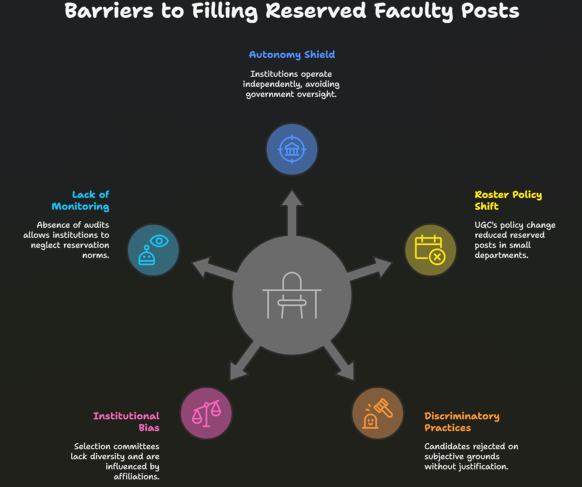Font size:
Print
Reserved Faculty Posts Left Unfilled: A Troubling Barrier to Social Justice in Academia
Vacant Reserved Faculty Posts and the Urgent Need for Inclusive Excellence in Indian Universities
Context: Despite India’s constitutional commitment to social justice and the inclusive goals of NEP 2020, a significant proportion of reserved faculty posts in central universities and elite institutions remain vacant in 2025.
What does the National Education Policy (NEP) 2020 say about inclusion?
- The NEP 2020 emphasises multidisciplinary, inclusive, and equitable education, aiming to increase participation from underrepresented groups.
- It advocates for institutional transformation and promoting faculty diversity to foster social justice. However, unless existing gaps in recruitment are bridged, the vision remains aspirational.
What is the issue regarding reserved faculty posts in Indian higher education institutions (HEIs)?
- Despite India’s constitutional commitment to social justice and affirmative action, a large number of reserved faculty positions for Scheduled Castes (SCs), Scheduled Tribes (STs), Other Backward Classes (OBCs), and Economically Weaker Sections (EWS) remain unfilled in central universities and premier institutions like IITs, IIMs, and AIIMS.
- As per a 2023 UGC report, about 30% of reserved faculty posts remain vacant, especially in senior positions (associate professor and professor).

Who is responsible for implementing reservations in faculty positions?
- The University Grants Commission (UGC), along with the Ministry of Education, is responsible for ensuring that central universities and institutions of national importance comply with reservation norms.
- However, institutional leadership such as Vice-Chancellors, Directors, and Selection Committees, many of whom belong to dominant social groups, play a critical role in either enabling or impeding the effective implementation of these policies.
How does this affect students and India’s higher education system?
- Undermines Inclusion: The absence of diverse faculty reduces role models and reinforces systemic exclusion of marginalised communities.
What does the Constitution and law say about reservation in faculty recruitment?
- Under Articles 15(4) and 16(4) of the Indian Constitution, the state is empowered to make special provisions for the advancement of socially and educationally backward classes and to ensure representation in public employment.
- The Central Educational Institutions (Reservation in Teachers’ Cadre) Act, 2019 restored the institution-level roster system, affirming that reservation applies to all teaching posts in central institutions.
- Affects Quality and Perspective: Lack of varied socio-cultural perspectives in academia weakens critical thinking and innovation in education.
- Reduced Employability: With 25% teaching posts vacant, reliance on contractual teachers with less accountability affects education quality and student outcomes, including employability.
How can this issue be addressed effectively?
- Enforcement & Monitoring: Strengthen UGC enforcement, with mandatory audits and public disclosure of reservation compliance.
- Restore Inclusive Rostering: Revisit or fully implement the 200-point roster system to ensure fair distribution of reserved posts across departments.
- Diversify Selection Panels: Include representatives from reserved categories in interview boards and standardise evaluation criteria.
- Legal Oversight: Expedite Supreme Court rulings on the legality of the 13-point system to prevent misuse.
- Capacity Building: Invest in mentorship and faculty development programs to build a larger pool of qualified candidates from marginalised groups.
- Political Will: Move beyond slogans—governments must enforce compliance at premier institutions through executive directions and sanctions if needed.


